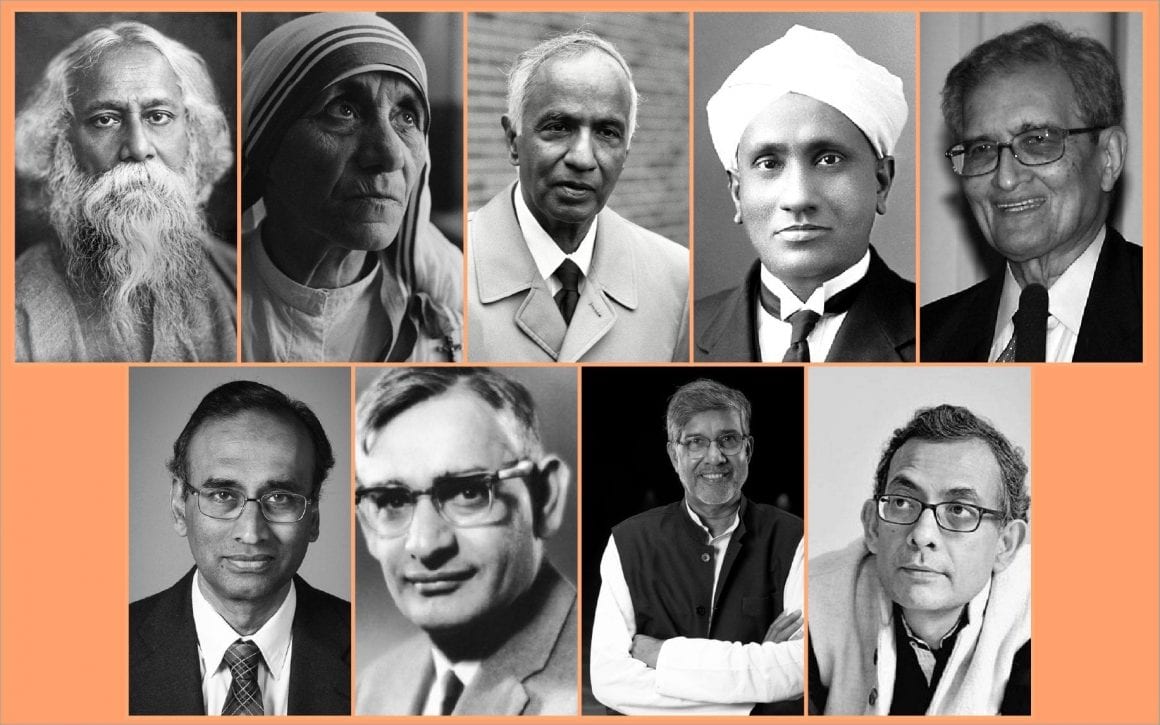India has given many great minds to the world whose contributions in literature, peace, science, and economics have been globally recognized. The Nobel Prize, one of the highest international honors, has been awarded to several Indians over the years. Let’s take a look at the complete list of Indian Nobel Laureates from 1913 to 2025 and their remarkable achievements.
What is the Nobel Prize?
The Nobel Prizes are among the world’s most prestigious awards, given every year to honor people who make great contributions to humanity. Started in 1901 in memory of Alfred Nobel, these prizes are awarded in the fields of Physics, Chemistry, Medicine, Literature, Peace, and later Economics (added in 1968). They recognize outstanding achievements that benefit mankind globally.
Nobel Prize Winners in India Till Today
India has seen a total of nine Nobel Prize laureates from 1913 to 2025. The first Indian to achieve this prestigious honor was Rabindranath Tagore, who was awarded the Nobel Prize in 1913 for his exceptionally moving, original and exquisite poetry. India has seen a total of nine Nobel Prize laureates from 1913 to 2024, in the following fields:
- Literature: Rabindranath Tagore (1913)
- Physics: C. V. Raman (1930), Subrahmanyan Chandrasekhar (1983)
- Physiology or Medicine: Har Gobind Khorana (1968)
- Peace: Mother Teresa (1979), Kailash Satyarthi (2014)
- Economics: Amartya Sen (1998), Abhijit Banerjee (2019)
These laureates have made significant contributions to a wide range of fields, including literature, physics, chemistry, physiology or medicine, peace, and economics. The achievements of Indian Nobel laureates are a source of great pride for the country. Their work has had a profound impact on the world, and they continue to inspire generations of Indians to pursue excellence in their chosen fields.
History of the Nobel Prize
The Nobel Prize, established in 1901 to honor the memory of Swedish scientist Alfred Nobel, is awarded to individuals who have made significant contributions for the betterment of humanity. This prestigious award is usually offered in six different fields, that is literature, Physics, Chemistry, Economic, Science, Peace and Physiology or Medicine.
When Alfred Nobel died in 1896, in his will he passed on his asset to be used for the establishment of prizes which are names “Nobel Prizes”. The Nobel Prize was first awarded in 1901. In 1968, a central bank of Sweden, that is, Sveriges Riksbank funded the establishment of the Nobel Prize for Economic Sciences. From then onwards, the Nobel Prizes are awarded in six different fields.
Nobel Prize Insignia
The awardee of the Noble Prize is conferred with three things- a medal, a diploma and award money. The Nobel Prize insignia are made of 24 karat gold plated with green gold. They are about 65 millimeters in diameter and weigh about 175 grams. The medals are awarded to the laureates at a ceremony in Stockholm, Sweden, on December 10, the anniversary of Alfred Nobel’s death.
List of Nobel Prize Winners in India
The first Indian Nobel laureate was Rabindranath Tagore, who won the Nobel Prize in Literature in 1913. The most recent Indian Nobel laureate is Abhijit Banerjee, who won the Nobel Prize in Economics in 2019.
The Indian Nobel laureates have made significant contributions in a variety of fields, including literature, physics, chemistry, medicine, peace, and economics. Their work has helped to advance knowledge and understanding in these fields, and has had a positive impact on the world. Here is the list of Nobel Prize Winners:
| S. No. | Nobel Prize Winners | Category | Year |
| 1. | Rabindranath Tagore | Literature | 1913 |
| 2. | CV Raman | Physics | 1930 |
| 3. | Har Govind Khurana | Medicine | 1968 |
| 4. | Mother Teresa | Peace | 1979 |
| 5. | Subrahmanyam Chandrasekhar | Physics | 1983 |
| 6. | Amartya Sen | Economics | 1998 |
| 7. | Venkatraman Ramakrishnan | Chemistry | 2009 |
| 8. | Kailash Satyarthi | Peace | 2014 |
| 9. | Abhijit Banerjee | Economics | 2019 |
History behind the Indian Nobel Laureates
India has produced nine Nobel laureates, the first of whom was Rabindranath Tagore in 1913. Since then, Indians have won the Nobel Prize in a variety of fields, including literature, physics, chemistry, physiology or medicine, and peace. The history of Indian Nobel laureates is a story of excellence and achievement. These individuals have made significant contributions to their fields of study and have had a positive impact on the world.
Know About Indian Nobel Laureates in Brief
India has nine Nobel laureates who have made remarkable contributions in various fields like peace, literature, science, and economics. These individuals have brought pride to the nation with their groundbreaking achievements, leaving a lasting impact on both India and the world.
1. Rabindranath Tagore
Rabindranath Tagore was conferred with Nobel Prize in the category of literacy in 1913 for his profoundly sensitive, fresh and beautiful verse. Often called Bard of Bengal and Gurudev, Tagore is one of India’s most dignified figures in India. Rabindranath Tagore was the first Indian to be awarded the Nobel Prize.
2. CV Raman
Sir Chandrashekhar Venkata Raman or CV Raman is recognised for Nobel Prize in 1930 in the field of Physics for his work on the scattering of light and for the discovery of the effect named after him. His discovery is also referred to as the “Raman Effect”. He is among the greatest Nobel Prize winners in India.
3. Har Govind Khurana
Har Govind Khurana was awarded the Nobel Prize in the field of Physiology or Medicine in 1968 along with Marshall W. Nirenberg and Robert W. Holley for their interpretation of the genetic code and its function in protein synthesis. H.G.Khurana is an Indian-American Biochemist. His research work related to the synthesis of functional genes outside the living organism.
4. Mother Teresa
Mother Teresa was the first Indian women to be conferred with the Nobel Prize in the category of Peace in 1979. She was born in the Republic of Macedonia. At the age of 19, she moved to India and spent the rest of her life in India as a Roman Catholic nun and as a missionary serving the “poorest of the poor” in slums in the city. Her humanitarian work led to the establishment of Missionaries of Charity.
5. Subrahmanyan Chandrasekhar
Subrahmanyam Chandrasekhar was awarded the Nobel Prize in the field of Physics in 1983 for his theoretical studies of the physical processes of importance to the structure and evolution of the stars. He is an Indo-American mathematician. His invention relates to the establishment of the physical process involved in the evolution of stars.
6. Amartya Sen
Amartya Sen was awarded the Nobel Prize in 1998 in the field of Economic Sciences for his contributions to welfare economics. He was born in Manikganj (British India). Sen studied economics and taught the subject in many reputed institutions in both the US and the United Kingdom.
7. Venkatraman Ramakrishnan
Venkatraman Ramakrishnan was awarded the Nobel Prize in 2009 in the field of Chemistry for his work in studies of the structure and function of the ribosome. The Nobel Prize is given by the Royal Swedish Academy of Services.
8. Kailash Satyarthi
Kailash Satyarthi was born in Madhya Pradesh and was awarded the Nobel Prize in 2014 in the field of Peace for his struggle against the suppression of children and young people and for the right of all children to education. He is an activist who has dedicated his whole life to children’s right and education spotlight.
9. Abhijit Banerjee
Abhijit Banerjee is an Indo-American who was conferred with the Nobel Prize in 2019 in the field of Economic Sciences. He was awarded the Nobel Memorial Prize in Economic Sciences with his wife Esther Duflo and Harvard University’s Michel Kremer.




 Weekly Current Affairs One Liners 16th t...
Weekly Current Affairs One Liners 16th t...
 Which District is known as the Medical C...
Which District is known as the Medical C...
 Which was the First Women's University i...
Which was the First Women's University i...








